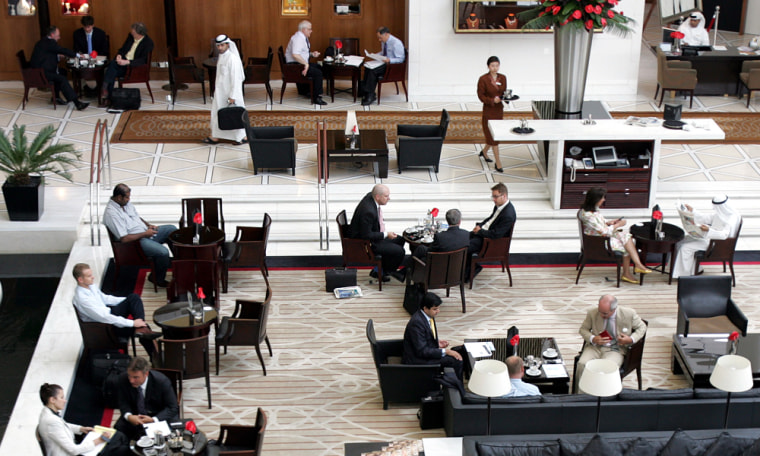High oil prices are handing major business clout to a handful of state-owned Gulf companies that have gone on an overseas buyout binge targeting businesses such as Dow Chemical Corp.
While a formal offer for Dow has yet to surface and Congress forced Dubai Ports World to sell off the U.S. ports operations it purchased last year as part of a larger deal, other energy-backed Arab acquisitions have succeeded.
In recent years, Arab investors have bought major New York hotels, the Loehmann's retail chain and a couple of defense plants in the United States. But they are proceeding cautiously in a country they feel has turned a cold shoulder to their involvement since the Sept. 11 attacks.
Analysts say the Arab buyout binge is close to triggering the type of U.S. political backlash seen in the 1980s when Japanese investors bought iconic properties like Rockefeller Center. Americans might bristle at the notion that their gas money is being recycled to buy such prominent American names. Or politicians might stir voters with claims of national security, as during the DP World imbroglio.
For now, the election-year backlash over the Dubai Ports purchase hasn't been replicated, despite a growing number of buyouts. Last year, Dubai International Capital, an investment company owned by Dubai ruler Sheik Mohammed bin Rashid Al Maktoum, bought a British defense company, Doncasters PLC, that makes parts for U.S. fighter jets and tanks. This year DIC bought and then sold most of the Madame Tussauds wax museum chain.
Another Dubai investment firm, Istithmar, paid $340 million for a string of six well-known buildings in New York City, including Knickerbocker and W hotels as well as Manhattan's five-star Mandarin Oriental hotel. Istithmar, also state-owned, also holds 2.4 percent of Time Warner shares and options and in July picked up New York-based specialty retailer Loehmann's for $300 million.
And state-owned Dubai Aerospace Enterprise Ltd. is reported to be finalizing a $1.8 billion deal to buy Carlyle Group-owned Standard Aero Holdings Inc., which overhauls engines and turbines used in small jets, as well as Landmark Aviation, an aircraft maintenance company. Carlyle itself maintains an investment office in Dubai.
Earlier this month, there were reports that Middle Eastern investors were behind talk of a leveraged buyout of Dow Chemical, a huge deal that might have been worth $50 billion. Media reports suggested the state-owned Kuwait Investment Authority might be involved.
Dow fired two executives, accusing them of trying to negotiate a deal behind the company's back, which ended the buyout speculation. But Americans couldn't help noticing that Mideast oil money has amassed to the point where it could fund the biggest leveraged buyout in U.S. history.
After saturating their home market with some $1 trillion in project investments, state-owned firms in the United Arab Emirates, Saudi Arabia, Kuwait, and Qatar have increasingly looked overseas for companies and trophy real estate to acquire.
But Arab investors aren't just looking at assets in America, where the potential for political backlash is a well-known deterrent. They have made even larger investments in Asia and Europe and look set to buy more while energy prices remain high, said Zahed Chowdhury, head of research at Deutsche Bank in Dubai.
Chowdhury said the U.S. backlash amounted to "political mileage for whichever senator is leading the bandwagon."
"If we've got oil prices above $50 a barrel, we're likely to see these things continue," said Steve Brice, an economist at Standard Chartered Bank in Dubai. "The longer oil prices remain high, the more money there will be for overseas investments."
Oil was trading around $65 a barrel Monday. Anything over $40 a barrel gives Gulf governments a budget surplus to invest, said Simon Williams, an economist with HSBC Bank in Dubai.
Gulf countries are scrambling to diversify to protect their economies against a downturn. The Emirates appears furthest along; Brice estimates its foreign assets returned at least $30 billion in 2006, while hydrocarbon exports reaped nearly $60 billion.
Saudi Arabian Basic Industries Corporation, or SABIC, paid $700 million last year for the European chemicals unit of U.S.-based Huntsman Corp., and is reportedly putting together a bid of as much as $12 billion for the plastics unit of General Electric Co. Mubadala Development, owned by the government of Abu Dhabi emirate, holds a 35 percent stake in Italian aircraft engine maker Piaggio Aero Industries, a quarter of European vehicle management company LeasePlan Corp. and five percent of Ferrari.
DIC, with over $6 billion in investment funds, purchased theme park operator Tussauds Group in 2005 for $1.6 billion and sold 80 percent of its stake in the wax museum chain to the Blackstone Group, the U.S. private equity giant, for $2 billion last month. DIC also bought out British hotel chain Travelodge for $1.23 billion in August.
Its $1.2 billion buyout of Doncasters last year required U.S. approval because the company makes parts for the U.S. F-35 Joint Strike Fighter jet and M-1 Abrams tank.
Bill Reinsch, president of the National Foreign Trade Council, a Washington, DC-based business group, said it is difficult to predict whether any specific transaction might spur a protectionist reaction from Congress.
"DP World proved the capacity of one of these things to set people off unexpectedly," said Reinsch, who served as a Commerce Department official during the Clinton administration. "It wouldn't surprise me if it happened again."
Brice said he had little sympathy for Americans worried about Arab investment, especially when Arab buyouts cause little stir in Europe and Asia.
"If Iran wanted to buy something in the U.S., that wouldn't be viewed favorably. But these are allies. What would (Americans') concerns be?" said Brice.
"The United States is always going to be an important destination for Gulf funds," HSBC's Williams said. "But it's also clear the Gulf states have a broad horizon. They're looking at Europe and emerging markets very closely."
